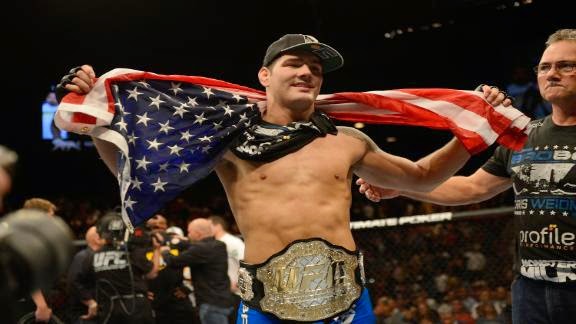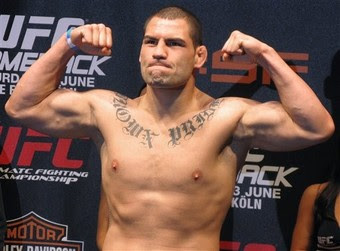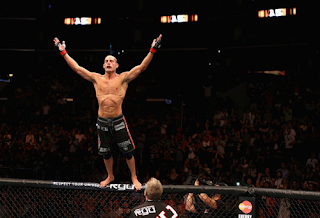The first part of Off the Gold Standard discussed the difficulties in assessing the value of titles to the Ultimate Fighting Championship. While the promotion itself struggles to develop champions that draw dollar figures, UFC gold still benefits the men and women that carry championship belts. Even if some of these individuals lack the drawing power that the UFC needs at this point, they are still seeing results in their personal bank accounts.
Take Chris Weidman, for instance. The New York native did himself a huge financial favor when he stopped Anderson Silva at UFC 162. For that fight he earned $48,000 — $24,000 to show and an additional $24,000 for winning the UFC’s middleweight title. However, Weidman made the smart move of taking that fight when his deal with the promotion was due to expire. Though he took a risk in fighting the man considered the best fighter on the planet, his victory reaped huge rewards. Weidman could now negotiate with the UFC while the title was sitting in his corner. Without it he would have been at a major disadvantage. The result? A mere 5 months later his salary increased to $200,000 to show and $200,000 to win in his UFC 168 title defense. Quite the raise by any standards.
This kind of situation isn’t new in professional sports. We’re all familiar with free agency, but every year there are stories of basketball, baseball, and football players under contract who “hold out” for more money or a to renegotiate better deal. Sometimes the situation plays out to their benefit, and other times it can go very bad. The UFC found itself in a similar position recently when its current light heavyweight champion, Jon Jones, decided that he wanted his deal restructured before accepting a fight against number one contender Alexander Gustafsson. This was after Jones verbalized his frustration with not being as well-promoted as some other fighters in the organization. (As a fighter with “points” on PPV, a lack of sufficient promotion can also affect his bottom line financially.) However, because this situation unfolded in the public eye, it didn’t help Jones’s reputation at all.
New bantamweight champion T.J. Dillashaw earned $36,000 for his win over Renan Barao at UFC 173. The Team Alpha Male member was still competing on his Ultimate Fighter contract, which severely hampered his opportunity to demand a higher rate before the bout. However, it will be interesting to see whether his newly-won title now leads to a bump in his pay grade. Rumors about who his next opponent might be continue to bubble, so expect Dillashaw to make such a play, especially if the UFC attempts to make a fight between Dillashaw and his close friend and training partner, Urijah Faber. During an interview on the Sherdog Radio Network, Dillashaw joked that he and Faber would have to “get rich” in order to fight one another.
It’s likely that when these kinds of disputes about pay and promotion play out in the media, the athlete bears the brunt of the negative fallout. Jones is obviously not as big of a star as the NBA’s LeBron James, but when James decided to “take his talents to South Beach” back in 2010, he went from hero to villain in an instant in many fans’ eyes. Jones’s transition has been occurring at a slower rate, but public disputes with UFC management which deny fans the big fights they crave have tarnished his reputation. Jones-Gustafsson II was eventually booked for September 27 at UFC 178, and will likely be the biggest fight of 2014, but Jones was still widely criticized, even if he ultimately did reach terms with the UFC. If Jones walks away from the bout with the title still in his possession, expect him to try yet again to increase his pay, just as he did leading into this contest.
As prizefighters, the individuals under contract with the UFC seek to make as much money as possible during their short careers. Acquiring a title belt is one way to boost pay (though obtaining one is one of the hardest feats in the sport). From the days of Randy Couture, UFC champions have been using the belt as a bargaining chip to earn bigger paychecks. This isn’t a phenomenon unique to MMA. However, as the UFC becomes more and more reliant on reliable headliners to drive buyrates, champions have never had more leverage. More and more, these athletes are starting to see he (or she) that holds the gold sets the standards. And that won’t be changing anytime soon.





